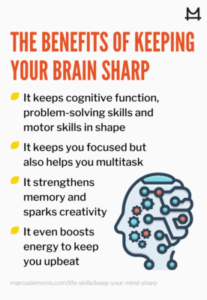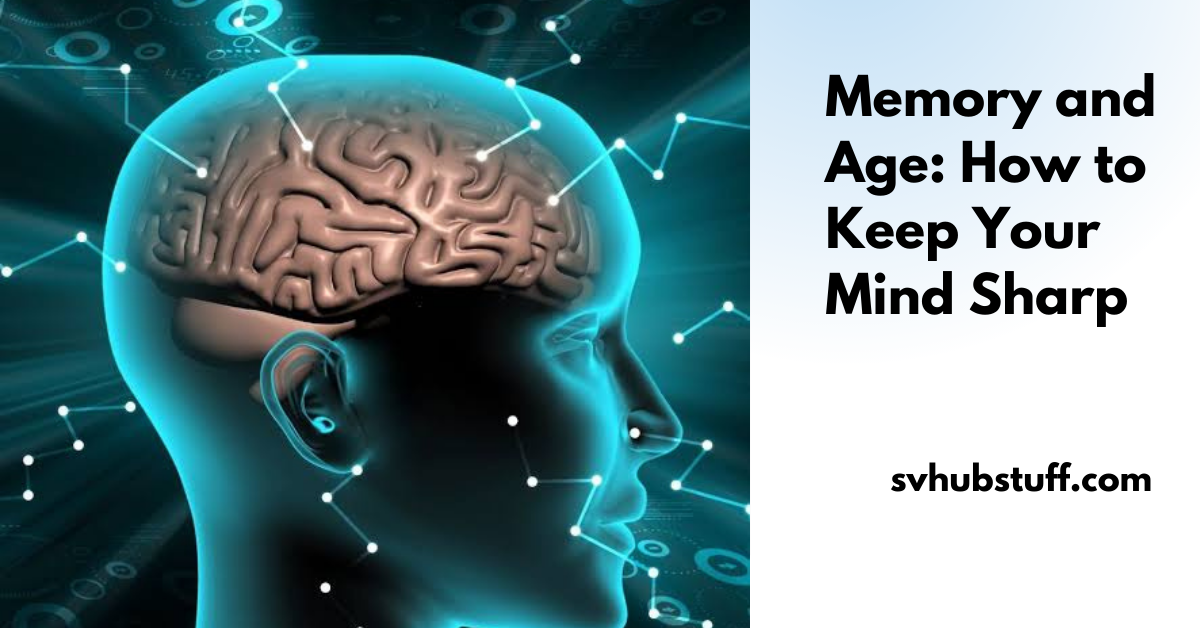Aging is a natural part of life, and with it often comes concerns about memory decline. While it’s true that memory can change as we age, it’s not a one-way street toward forgetfulness. There are many strategies and lifestyle changes you can adopt to keep your mind sharp and your cognition at its best.
In this comprehensive guide, we’ll explore the relationship between memory and age, common memory changes, and practical tips for maintaining mental agility as you grow older.
Understanding Memory and Aging
Memory is a complex cognitive function that involves various processes, including encoding, storing, and retrieving information.
As we age, several factors can impact these processes, leading to changes in memory:
- Normal Age-Related Changes: It’s important to recognize that some cognitive changes are entirely normal with age. These include occasional forgetfulness, slower information processing, and a decreased ability to multitask.
- Types of Memory: It is not a single entity; it consists of different types, including working memory (short-term memory), episodic memory (related to personal experiences), and semantic memory (knowledge about facts and concepts). Age can affect these memory types differently.
- Brain Structure Changes: Structural changes in the brain, such as a decrease in the size of the hippocampus (a key region for memory), can impact memory functions.
- Health Factors: Chronic health conditions like hypertension, diabetes, and cardiovascular disease can affect blood flow to the brain, potentially impacting memory.
- Medications and Lifestyle: Certain medications and lifestyle factors, such as poor nutrition, lack of physical activity, and inadequate sleep, can also contribute to this.
Benefits of having a sharp memory
Maintaining a sharp remembering power is a valuable investment in your overall well-being and success. By incorporating memory-enhancing strategies and leading a brain-healthy lifestyle, you can enjoy these numerous benefits throughout your life.

- Improved Cognitive Function: A sharp memory is a sign of overall cognitive health. It signifies that your brain is functioning well, allowing you to think clearly, solve problems, and make decisions more effectively.
- Enhanced Learning Abilities: A strong memory enables you to acquire new knowledge and skills more efficiently. You can grasp and retain information from books, lectures, and experiences, which can lead to personal and professional growth.
- Better Academic and Professional Performance: Whether you’re a student or a professional, a sharp mind can boost your performance. It helps you excel in exams, remember important information in meetings, and stay on top of your responsibilities.
- Increased Creativity: Memory is closely linked to creativity. A good memory allows you to draw connections between seemingly unrelated ideas and think outside the box, leading to more innovative thinking.
- Effective Problem Solving: Memory is essential for problem-solving. It helps you recall past experiences and solutions, allowing you to apply them to new challenges effectively.
- Enhanced Communication Skills: A strong memory helps you remember names, faces, and details about people, making social interactions smoother. It also aids in storytelling and effective communication.
- Reduced Stress: Forgetfulness and memory lapses can be stressful. Maintaining a sharp memory can reduce anxiety and enhance your overall mental well-being.
- Greater Independence: A good memory allows you to be more self-reliant. You can manage your daily tasks, appointments, and responsibilities without relying heavily on external reminders.
- Maintained Quality of Life as You Age: Cognitive decline is a natural part of aging, but a sharp memory can slow down this process. It enables you to remain independent and engaged in a fulfilling life as you grow older.
- Improved Decision-Making: Memory aids in decision-making by allowing you to recall past experiences and their outcomes. This helps you make informed choices in various aspects of life.
- Stronger Relationships: Remembering important dates, events, and details about loved ones shows that you care. It can strengthen your relationships and create deeper connections with family and friends.
- Increased Productivity: A sharp memory can enhance your productivity in both personal and professional settings. You can efficiently manage tasks, projects, and deadlines without constant reminders.
- Positive Self-Esteem: Knowing that you can rely on your memory boosts self-confidence and self-esteem. It empowers you to take on challenges and achieve your goals.
- Lifelong Learning: A sharp memory encourages a mindset of continuous learning. You’re more likely to explore new interests and acquire new skills throughout your life.
- Resilience: When you have a strong memory, you can more easily adapt to changing circumstances and recover from setbacks. You have the mental resources to face challenges with confidence.
- Better Quality of Life: Ultimately, a sharp memory contributes to a higher quality of life. It enables you to fully engage in life’s experiences, cherish memories, and make the most of your cognitive abilities.
How to maintain a Sharp Memory as You Age
While age-related memory changes are a reality, the good news is that there are many strategies and lifestyle choices you can embrace to promote cognitive health and memory retention:
1. Stay Physically Active:
- Regular exercise not only benefits your body but also your brain. It improves blood flow, reduces inflammation, and enhances brain function. Aim for at least 150 minutes of moderate-intensity exercise per week.
2. Eat a Brain-Boosting Diet:
- Opt for a diet rich in fruits, vegetables, whole grains, lean proteins, and healthy fats. Omega-3 fatty acids, found in fish, walnuts, and flaxseeds, are particularly beneficial for brain health.
3. Stay Mentally Active:
- Engage in activities that challenge your brain, such as puzzles, crosswords, Sudoku, or learning a new language. Lifelong learning keeps your mind sharp.
4. Socialize Regularly:
- Maintaining social connections and engaging in conversations can stimulate your brain and reduce the risk of cognitive decline.
5. Prioritize Quality Sleep:
- Aim for 7-9 hours of restful sleep each night. Sleep is essential for memory consolidation and cognitive functioning.
6. Manage Stress:
- Chronic stress can negatively impact memory. Practice stress management techniques like mindfulness, meditation, or yoga to reduce its effects.

7. Stay Hydrated:
- Dehydration can impair cognitive function. Ensure you’re drinking enough water throughout the day.
8. Manage Chronic Health Conditions:
- If you have chronic conditions like diabetes or hypertension, work closely with your healthcare provider to manage them effectively, as they can impact cognitive health.
9. Review Medications:
- Consult your healthcare provider to review your medications for potential cognitive side effects. They can adjust prescriptions if necessary.
10. Stay Organized: – Use calendars, planners, or smartphone apps to stay organized and keep track of appointments and important tasks.
11. Seek Intellectual Challenges: – Engage in hobbies or activities that involve problem-solving, creativity, or critical thinking.
12. Practice Mindfulness: – Mindfulness exercises can improve attention and memory. Try incorporating mindfulness meditation into your daily routine.
13. Stay Positive: – A positive outlook and a sense of purpose in life have been associated with better cognitive health. Cultivate a positive mindset.
14. Stay Informed: – Keep up with the latest research on memory and cognitive health. Understanding how your brain works can help you make informed choices.
15. Get Regular Check-ups: – Visit your healthcare provider for routine check-ups. Some medical conditions that affect memory, like vitamin deficiencies or thyroid disorders, can be treated.
Memory Note
Aging doesn’t mean you have to resign yourself to memory decline. By adopting a proactive approach to cognitive health and implementing the strategies mentioned in this guide, you can keep your mind sharp and maintain a robust memory as you age. Remember, a healthy lifestyle that includes regular exercise, a balanced diet, mental stimulation, and social engagement can go a long way in preserving your cognitive abilities and enhancing your overall quality of life. Embrace these practices, and your future self will thank you for it.



